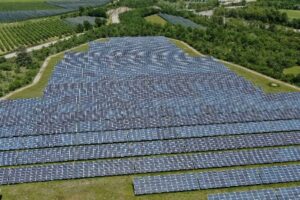What is the Environmental Impact of Solar Power?

In recent years, solar power has emerged as a promising and sustainable alternative to conventional energy sources. As the global community grapples with the challenges of climate change and environmental degradation, understanding the environmental impact of solar power is crucial. This article delves into the various facets of how solar energy contributes to environmental sustainability, but also how do waste solar panels can affect the environment. so, what is the environmental impact of solar power?
How Solar Energy Contributes to Environmental Sustainability
1. Reduced Greenhouse Gas Emissions
One of the primary environmental benefits of solar power is its role in reducing greenhouse gas emissions. Unlike fossil fuels, solar energy production does not release harmful pollutants such as carbon dioxide and methane into the atmosphere. The transition to solar power helps mitigate the effects of climate change by curbing the emission of gases responsible for global warming.
2. Minimal Water Usage
Traditional power generation methods, such as coal and nuclear plants, require significant water resources for cooling. In contrast, solar photovoltaic systems have minimal water requirements. This aspect is particularly important in regions facing water scarcity, making solar power a more sustainable choice for energy production.
3. Land Use Efficiency
Solar power installations can be integrated into existing infrastructures, making use of rooftops, deserts, and other underutilized areas. Unlike large-scale agricultural or industrial activities, solar farms have a lower impact on biodiversity and ecosystems. Proper land management practices can further enhance the coexistence of solar projects and local flora and fauna.
4. Lifecycle Assessments
To comprehensively evaluate the environmental impact of solar power, lifecycle assessments are conducted. These assessments consider the entire life cycle of solar panels, from raw material extraction and manufacturing to transportation, installation, and eventual decommissioning. Ongoing advancements in technology and recycling methods aim to minimize the environmental footprint of solar panel production and disposal.
5. Resource Conservation
Solar power harnesses energy from the sun, an infinitely renewable resource. Unlike finite fossil fuels, solar energy ensures a continuous and sustainable power supply. As technology advances, the efficiency of solar panels has improved, requiring fewer materials for the same energy output, thereby conserving resources and reducing environmental impact.

A small solar power plant installed on a hill, image source: Unsplash
6. Economic and Social Impact
Beyond its environmental benefits, the widespread adoption of solar power contributes to economic growth and job creation. The solar industry provides opportunities for employment in manufacturing, installation, maintenance, and research and development. Additionally, decentralized solar systems empower communities by providing access to clean and affordable energy.
7. Technological Advancements
The ongoing evolution of solar technology holds the promise of further minimizing its environmental impact. Researchers are exploring innovative materials and manufacturing processes to enhance the efficiency of solar panels while reducing their environmental footprint. Emerging technologies, such as perovskite solar cells and advanced energy storage solutions, aim to make solar power even more accessible and sustainable.
8. Grid Resilience and Energy Independence
The decentralization of energy production through solar power contributes to grid resilience and energy independence. Distributed solar installations, such as rooftop solar panels on homes and businesses, reduce the reliance on centralized power plants. This not only enhances the stability of the electrical grid but also makes communities more resilient to disruptions and disasters.
9. Public Awareness and Policy Advocacy
Increasing public awareness about the environmental benefits of solar power is essential for fostering its widespread adoption. Governments and policymakers play a crucial role in incentivizing renewable energy initiatives and implementing regulations that encourage the transition to clean energy. Supportive policies can accelerate the deployment of solar technologies and drive positive environmental outcomes.
How Waste Solar Panels Can Affect the Environment
While solar panels have a long lifespan, addressing electronic waste (e-waste) remains a consideration. Waste solar panels, often referred to as end-of-life solar panels or photovoltaic (PV) modules, can pose environmental challenges if not managed properly. While solar energy is known for its environmental benefits during operation, it’s essential to address the potential environmental impact associated with the disposal of solar panels. Here are some considerations:
1. Hazardous Materials
Solar panels contain materials that can be hazardous if not handled and disposed of correctly. These materials may include cadmium, lead, and other potentially toxic substances used in the manufacturing process.
2. E-Waste Concerns
Solar panels fall under the category of electronic waste (e-waste). Improper disposal, such as sending them to landfills, can contribute to the growing e-waste problem. E-waste can leach harmful substances into the soil and water, posing risks to ecosystems and human health.

Solar panels destroyed by Hurricane Ian have become e-waste, image source: Unsplash
3. Recycling Challenges
While efforts are being made to improve recycling methods for solar panels, there are challenges associated with the process. Solar panels are composed of various materials, and separating and recycling these materials efficiently can be complex. Limited infrastructure for solar panel recycling in some regions can also be a barrier.
4. Resource Use
The production of new solar panels requires raw materials and energy. If end-of-life panels are not recycled effectively, there is a missed opportunity to recover valuable materials, leading to an increased demand for new resources and contributing to environmental degradation.
5. Global Impact
As solar energy adoption continues to grow globally, the volume of waste solar panels is expected to increase. The lack of standardized recycling practices and global policies for managing solar panel waste poses challenges for ensuring responsible disposal on a large scale.
6. Regulatory Frameworks
Different regions have varying regulations and guidelines for the disposal and recycling of solar panels. In some areas, there may be limited enforcement or awareness of proper disposal methods, potentially leading to improper handling of waste solar panels.
Conclusion
As the world seeks sustainable solutions to address the challenges of climate change, the environmental impact of solar power emerges as a beacon of hope. Its ability to generate clean energy, reduce greenhouse gas emissions, and contribute to economic development positions solar power as a key player in the transition to a more sustainable and resilient future.
To mitigate the environmental impact of waste solar panels, it is crucial to prioritize the development of effective recycling technologies, establish clear regulatory frameworks for disposal, and promote awareness within the solar industry and among consumers about responsible end-of-life management. Recycling facilities that specialize in processing solar panels can play a key role in recovering valuable materials and minimizing the negative environmental effects associated with their disposal.
Continued research, technological innovation, and concerted efforts to integrate solar energy into mainstream energy systems will further amplify its positive environmental contributions, paving the way for a cleaner and greener planet.




